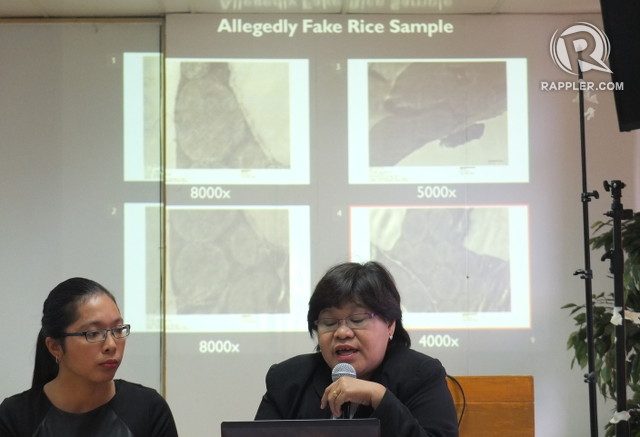SUMMARY
This is AI generated summarization, which may have errors. For context, always refer to the full article.

MANILA, Philippines – There is no fake rice in the Philippines so far, officials of the National Food Authority (NFA) assured on Thursday, August 6.
“What is clear from the series of tests is that there is no existence of ‘fake rice’ in our country,” NFA Administrator Renan Dalisay said in a news briefing.
Test results of rice samples reported to be “fake rice” show that the strange appearance of the rice was only due to a “retrogradation process” involving a series of freezing, thawing, and heating.
In other words, retograded rice can be termed as “stale rice,” NFA Food Development Center Director Jocelyn Sales said at the news conference.
The 50-gram rice sample from Davao City contaminated with a plasticizer chemical compound, dibutyl phthalate (DBP), was also found to be only an “isolated case.”
Test results showed that of the 21 rice samples tested, only the Davao sample was found with the presence of a chemical.
“What we have is an isolated case of chemically-contaminated sample which may have been the result of mishandling or pure neglect to safeguard rice from contaminants,” said Dalisay.
The tests were conducted by multiple agencies including the NFA’s Food Development Center (FDC), Philippine Rice Research Institute (PhilRice), International Rice Research Institute (IRRI), Research Institute for Tropical Medicine (RITM), and the Department of Health.
‘Stale’ rice
Though DBP was found only in the Davao sample, all the reported “fake rice” looked like styrofoam, prompting complaints by citizens.
But the tests showed that the samples were still rice, but in a degraded form.
RITM tests showed that the alleged fake rice is “morphologically different” from cooked NFA rice because it seemed to have undergone a series of quick freezing, thawing, and heating.
“When rice undergoes quick freezing, many small ice crystals form in and out of cells. Water will ooze out and you will get a spongy, styrofoam-like structure,” said Sales.
She likened retrograded rice to stale bread. Though dry, it is safe for eating, she added.
More tests confirmed that, despite its bad condition, it is still rice.
A DNA analysis by PhilRice showed that the rice sample was “positive for rice DNA.” IRRI tests supported the PhilRice finding.
“The IRRI rice is very similar to the unknown samples from NFA. The unknown samples are more similar to rice than to corn or sweet potato,” said Rose Cuevas of IRRI.
‘Don’t put hot food in plastic’
As for the contaminated rice from Davao City, it’s likely that the chemical came from plastic containers which was used to pack the cooked rice, said Sales.
The chemical DBP is typically used by plastic bag makers as an additive to make the bags more flexible. Without DBP, plastic bags can crumble.
The Davao rice was likely placed inside a plastic bag while still hot.
“You shouldn’t put hot food in plastic. When food is hot, the plasticizer (DBP) can migrate from plastic to the food,” said Sales.
Since reports of fake rice came to NFA’s attention on June 30, the agency has sent teams to make daily inspections of rice stalls in markets nationwide.
The NFA says it has responded to more than a hundred reports of suspected fake rice from different parts of the country.
The most recent report of fake rice came from Naga City in Bicol two days ago. The sample tested negative for contamination, and was proven to be rice, said Dalisay.
The agency gave assurances that it will continue its market monitoring activities.
“We remind the public to be very cautious in their own food handling practices as the government will continue to ensure that food, especially rice, will be available, affordable, accessible, and safe for the public,” said Secretary Francis Pangilinan, Presidential Assistant for Food Security and Agricultural Modernization. – Rappler.com
Add a comment
How does this make you feel?
There are no comments yet. Add your comment to start the conversation.